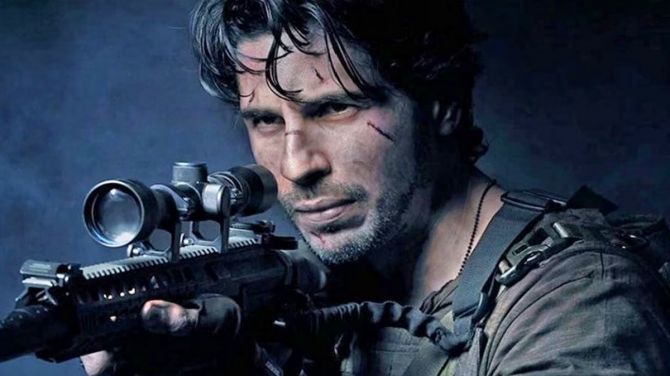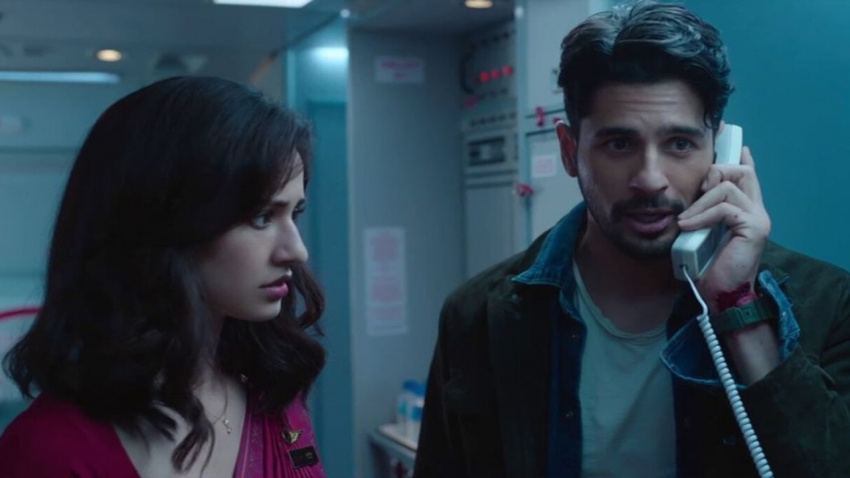CAST: Siddharth Malhotra, Raashii Khanna, Disha Patani, Ronit Roy, Tanuj Virwani
DIRECTORS: Sagar Ambre, Pushkar Ojha
In Theaters and Later on Amazon Prime Video
In an attempt to repeat the audiences feelings that were evoked in Shershaah, Dharma brings Sidharth Malhotra back in an armed forces avatar. This time, the plot fails to land.
Burdened by a disjointed script that fails to hit the mark, “Yodha” struggles from the outset. The film centers around a protagonist, once part of a now-disbanded elite unit, who finds himself on a flight bound for uncertainty. His quest for vengeance and redemption is the core around which the narrative by co-director Sagar Ambre spirals, amidst the chaos of malfunctioning aircraft and critical system failures. “Yodha” unfolds as a chaotic thriller, its narrative lost in a haze of confusion, challenging even the bravest of viewers to make sense of its perplexing plot.
An early scene introduces the lead character emerging from a river, miraculously keeping a smoke flare, which patriotically emits the Indian tricolor, dry underwater—a testament to his skill. This feat is outdone in the film’s climax with a similar tricolor smoke grenade that remarkably withstands both an explosion and a raging fire.
Arun Katyal (portrayed by Sidharth Malhotra), bearing the legacy of a martyred father, staunchly denies any wrongdoing on his part, patiently waiting for the opportunity to restore his tarnished reputation. When his moment arrives, he mysteriously finds himself on a flight from Delhi to London, puzzling everyone on board. In this aspect, “Yodha” triumphs, bewildering its audience with a narrative that seldom aligns with logical storytelling.
An initial sequence solemnly presents the return of Surender Katyal (a brief appearance by Ronit Roy), a fallen soldier, to his homeland in a wooden coffin. The film then shifts to the Indo-Bangladeshi frontier, where Arun Katyal confronts a vague group of malefactors—smugglers, infiltrators, or terrorists, their exact nature left ambiguous—and swiftly neutralizes them.
This segment aims to showcase Arun Katyal’s modus operandi: he is a man of action, not diplomacy, who doesn’t issue warnings or await instructions before engaging. His impulsive nature, averse to taking captives or hesitating for commands, eventually leads him into complications.
Despite any leniency viewers might extend, or their affinity for Sidharth Malhotra, “Yodha” struggles to maintain coherence, veering erratically from one narrative hiccup to the next. The film toys with the laws of aviation to an absurd degree, suggesting passenger planes can be easily manipulated by its characters, a notion that stretches believability to its limits.
Directed by Ambre and Pushkar Ojha, much of “Yodha’s” action is confined to an airplane’s cabin and its underbelly, culminating in a climactic scene at Islamabad’s Jinnah Hall amidst peace negotiations between India and Pakistan. Predictably, a terror scheme unfolds to derail the talks, underscoring the antagonist’s belief that war is merely a lucrative venture.
Audiences are left to witness the descent of “Yodha” into chaos, as it obliterates any semblance of logic or sensibility. Positioned as a tribute to the feats of a highly skilled soldier scapegoated by systemic failures, the protagonist’s journey reflects the dissolution of the esteemed Yodha Task Force, a narrative arc that encapsulates the film’s own turbulent flight into narrative disarray.
The film’s underdeveloped script struggles to provide a plausible rationale for the protagonist’s aggressive tactics, failing to explain his constant inclination towards confrontation over simpler, more diplomatic approaches.
For Arun Katyal, played by Sidharth Malhotra, patriotism is deeply personal, driven by the legacy of his father who sacrificed his life for the country. His narrative takes a turn when Priyamvada Katyal (Raashii Khanna), a high-ranking official and his spouse, testifies against him following a failed operation, leading to his reprimand for insubordination. In a move that prioritizes national duty over personal ties, Priyamvada seeks a divorce, further complicating Arun’s life.
Amidst these personal and professional crises, a family friend and colleague, Khan (Tanuj Virwani)—portrayed as the stereotypical “good Muslim” character often found in patriotic thrillers—unsuccessfully attempts to dissuade the couple from splitting up.
The narrative suggests, through scattered hints, that Arun’s turmoil stems from a vendetta against a terrorist who once ejected him from a plane, a traumatic experience that persistently torments him. This backstory, however, is pieced together from sparse details, leaving much to the audience’s interpretation due to the screenplay’s lack of clarity.
During a plane hijacking, the chief flight attendant (played by Disha Patani) moves through the cabin with the poise of a fashion model, biding her time until the moment arrives to unveil her combat skills and dive into action. Similarly, the co-pilot harbors unexpected plans that take the protagonist by surprise. The confined space of the aircraft becomes a battleground with intense skirmishes erupting in the aisle, lavatory, and cargo area, all while the aircraft perilously loses altitude and veers off its intended path.
Amidst the chaos, a novice—an intern boasting 200 hours of flight experience—finds herself thrust into the role of piloting the beleaguered aircraft as the situation intensifies. Attempting to make logical sense of the events unfolding in “Yodha” proves futile, as the film’s narrative elements stubbornly resist cohering into a plausible storyline.
Expecting Sidharth Malhotra to salvage this chaotic film is asking for too much. Despite his dynamic portrayal—darting, sprinting, delivering punches, and shooting amidst the turmoil, much of which his character instigates—he is unable to transcend the disarray that defines “Yodha.”
The rest of the cast appears to mechanically perform their roles, their expressions revealing nothing. Is this an embodiment of courage under fire? Hardly. It rather indicates that they, along with the viewers, find themselves at a loss to grasp the unfolding events.







